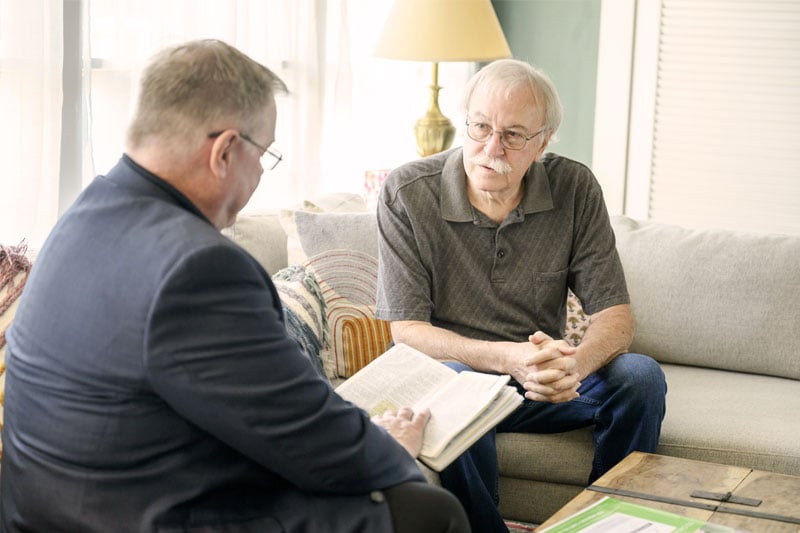The hospice journey is complicated for all involved, family members included. It can be hard to know what to expect or what feelings are normal when coping with a loved one’s end-of-life process.
By understanding common worries and what hospice support is available for families, you can be better prepared to manage challenges as they arise. In this article, we’ll explore some coping tips for when your family member is in hospice to help you navigate the journey.
Dealing with the Emotions of Hospice: Coping Tips
Seeing a parent, spouse, or loved one experience end-of-life stages can be emotionally painful. As a caregiver, you likely have several responsibilities, even if you are working with an agency to receive hospice care. With the knowledge of the impending loss of someone you love, you might be experiencing a range of complicated emotions and symptoms, including but not limited to:
- Despair, loneliness, or emptiness.
- Guilt, regret, anger, or sadness.
- Fatigue, weight loss, and even insomnia.
.jpg?width=612&height=408&name=Website%20Photos%20(5).jpg)
During this difficult time, you need techniques that will help you manage your emotions so that you can continue to be available to loved ones in their time of need and even experience a sense of peace.
Accept and Express Feelings
Start by acknowledging the reality of the experience and your feelings associated with it. You don’t want to crumble beneath the pressure of the emotions, but you also don’t want to disassociate from your feelings. If you’re someone who puts on a strong face or tends to be the emotional rock for other family members, keep in mind that suppressing your feelings can do more harm than good.
Instead, it’s best to try to engage with others and learn techniques to manage your emotions.
Maintain a Strong Support Network
Don’t be afraid to reach out to friends and family when you need it. Reach out before you feel like you can no longer hold in your feelings. Waiting too long can lead to panic attacks or severe levels of depression.
Consider Joining a Hospice Support Group
A hospice support group can provide caregivers valuable insight from other people going through a similar experience. Connecting with others who understand your experience can help you better understand your own situation. These sessions also provide caregivers with practical strategies for coping.
Consider Counseling
Even if you have a strong network of friends and family, it’s important to remember that they aren’t trained professionals in grief counseling. Grief counseling has been shown to be effective in research. 1 It provides one-on-one talk therapy that works to help create action around an experience that can feel helpless.
Family Hospice Guidance for Everyday Coping
While managing emotions with healthy coping strategies is important, it’s also crucial to know tips for everyday coping that reduce stress and benefit everyone involved in hospice care.
Spend Quality Time With Your Loved One
How you interact with an ailing loved one will depend on their state of mind. For example, someone in a later stage of life might not be able to converse in the same way as they used to. However, spending time with them is beneficial to you and your loved one.
Options to consider throughout any stage of illness include:
- Sharing old photos, memorabilia, videos, or family heirlooms.
- Reading their favorite authors or books aloud.
- Playing their favorite music.
- With consent, providing touch through massage to help reduce pain or stiffness.
- If the patient is up to it, reminiscing with them.
.jpg?width=692&height=389&name=Blog%20Graphic%20Callouts%20(6).jpg)
Make Time For Yourself
Equally as important as spending time with ailing loved ones is taking time to address your own needs. This may seem like a time that needs to be dedicated solely to your loved one but remember that your mental and physical health needs to be maintained.
Take time to complete tasks, maintain hygiene, eat healthy foods, exercise, read books on managing your emotions, and spend time on hobbies. If you need to, coordinate with your workplace to take time off.
Stay Organized
Although this is certainly a time in your life that will look different from others, staying organized with caregiver responsibilities and everyday tasks can help you maintain a sense of normalcy and make this time far more manageable.
Don’t let other aspects of your life fall apart— this will only make things feel more overwhelming. To stay organized, keep lists and a running calendar to ensure you’re keeping everything in check.
Share Caregiver Responsibilities
Even if your loved one is receiving hospice care through an agency, you still have caregiver responsibilities, such as:
- Ongoing emotional and psychological support.
- Meeting physical care needs for your loved one.
- Serving as a go-between between your loved one and the agency.
- Serving as an extra set of eyes on patient status and well-being.
- Coordinating care across different services.
Don’t feel like you need to take this on yourself—share duties with other family members or ask friends if you don't have family to lean on.
.jpg?width=654&height=436&name=Website%20Photos%20(4).jpg)
Prepare For Grief Symptoms
Preparing for grief caused by the loss of a loved one is also referred to as anticipatory grief. 2 Although it is similar to more typical types of grief, anticipatory grief includes emotions that are felt before a significant loss or death.
The best way to handle anticipatory grief is to recognize the symptoms before they develop into unmanageable problems. Generally, symptoms are presented as loneliness, sadness, depression, anxiety, and anger.
If others are involved, such as children or other family members, gently encourage them to express their grief. Hearing them out might seem like you are taking more on, but shared experiences can help you better understand your own experience of grief and feel less alone.
Family Hospice Guidance with Bereavement Support
Hospice support for families isn’t just for the end-of-life journey. It extends beyond the death of a loved one with bereavement services for at least 12 months after someone passes. This can be a difficult period, with some family members experiencing depression, anxiety or complicated grief. 3 Having this guidance in the months following a loss is important as you process your grief.
Take the Next Step: Support From Amedisys
As you navigate a loved one’s end-of-life stages, it’s important for you to develop coping techniques to address your mental and physical health. Hospice care services from Amedisys can help relieve ailing loved ones of pain and provide caregivers with much-needed support.
Knowing what type of care your loved one should be receiving versus the type of responsibilities you have as a caregiver often overlaps and— in some cases—becomes confusing. To learn more about different types of home health, read our resource on the differences between home health care and hospice care.
Deb Gallaher, MBA, MSN, RN, NE-BC, CHPN, is a Senior Hospice Clinical Education Specialist for Amedisys. She has 10 years of experience in hospice and is passionate about sharing her insights on high-quality care.
References |





